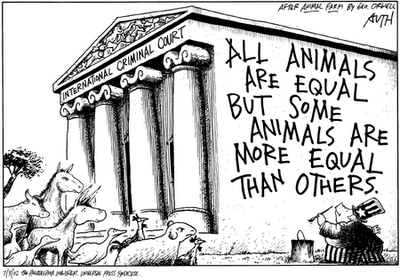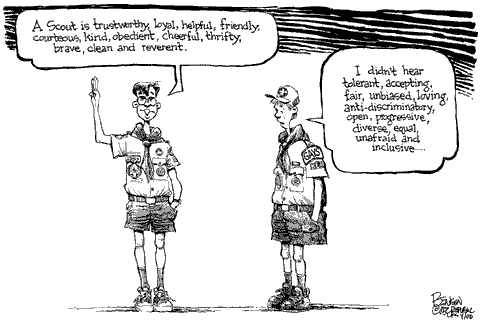Serendip is an independent site partnering with faculty at multiple colleges and universities around the world. Happy exploring!
sel209's blog

Entangling and Enabling: A handbook for BSA that encourages right relationships despite a disabling culture
For my final project, I chose to expand upon my third web event, which explored the idea of forming a right relationship between the Boy Scouts of American and the LGBTQ community. A restatement of my original introduction is useful in understanding the issue at hand:
“The Boy Scouts of America’s website is covered in testaments to the organization’s commitment to the betterment of America’s male youth. Its mission statement professes dedication to building active and conscientious citizens, its parent portal promises that it is the best organization to reinforce ethical standards and promote self-confidence, and its timeline gleams with the success of past service projects and awards from numerous presidents. What the website neglects to publicize, however, is perhaps the most telling statement of all about BSA’s moral and ethical belief system: the Boy Scouts do not allow openly gay members to join their ranks.”

Another Type of Asylum Seeker
Last Thursday, I attended a discussion with my Transitions to Adulthood class about the difficulties undocumented Americans face throughout their lifetimes. Since my knowledge of the topic was limited, I decided to do some research so that I would be well prepared for both class and community discussion. While researching, I stumbled upon this article: “Undocumented Women Forced To Give Birth While Shackled And In Police Custody“ To give you the Cliff Notes version, the article states that it’s legal in over half the states in the US to handcuff women to hospital beds while they’re giving birth if they’re being held for a criminal offense (in this case, being an undocumented immigrant). Additionally, in most instances, women are not allowed to have family members present while they’re giving birth, nor are they allowed to hold their newborns past the babies’ first 24 hours of life (unless, of course, there is no American relative to care for a baby, in which case it’s shipped out of the country with the rest of the family despite being an American citizen).

A Call for Papers- Gender, Sexuality, and Poverty
In case anyone's interested (the Women's Center at Haverford just received the email, and I thought someone might be interested in submitting a last minute paper...)
Call for Papers: "Gender, Sexuality, and Poverty"
2012 Women's Studies Conference
sponsored by the Central Pennsylvania Consortium
Saturday, March 31, 2012
8:30 am – 4:00 pm
Gettysburg College, Gettysburg PA

From Me to We
I was all set to react to the second Butler lecture given on 11/14, but somehow her talk became entangled with ideas we’ve been playing around with in class and these two thoughts are the result of that entanglement...

The Myth of Gendered Destiny
I work at the Women’s Center on Haverford’s campus, and we deal with a host of issues relating to sexuality. While I was at work this week, a male friend of mine came into the center, and somehow our conversation turned to the subject of how the issue of sexual assault is presented to freshmen during Customs week. While I admitted that I didn’t really remember the specifics of the talk that was given during my own freshman orientation, he told me he had been shocked by the emphasis he felt the campus put on the idea that when the issue of consent is in question, men are always to blame, and that and it is entirely the male partner’s responsibility to halt the encounter, particularly if alcohol is involved. He stressed to me how scared and helpless he felt at the implication that simply by being male and pursuing a sexual encounter he could unintentionally assault someone.

An "Out of Focus" Utopia
After our discussion ended on Tuesday, I left class still pondering the results of our utopia exercise. While some might think a perfect socio-politico-legal system is easy to construct in theory, I had (and continue to have) trouble conceptualizing a world in which “equality,” a word that implies affording all people the same status, rights, and opportunities*, does not inevitably translate into “sameness,” a word that wipes away all sense of individuality and fails to acknowledge or cherish differences. I’m reminded of Orwell’s Animal Farm, which details first the liberation of animals on a farm from oppressive humans, then the animals’ attempt to set up a utopian society in which all members of the farm are equal, and finally the emergence of a hierarchy in which (spoiler alert) the pigs take control of the farm and reduce the original seven commandments to only one: “All animals are equal, but some animals are more equal than others.”

(An interesting take on the current state of our society...)

Disability: The Clash Between Culture and Self
McDermott and Varenne’s essay on cultural constructions of disability nicely supplements Tuesday’s discussion of how we define “norms” and the ways in which norms come to exist in any given society. The class’s thoughts seem to closely mirror McDermott and Varenne’s claim that disability is best viewed as a culturally constructed concept, and we too attempted to picture whether the concept of disability would exist at all if the socially constructed boxes that confine our thoughts, not to mention our world, were lifted.



